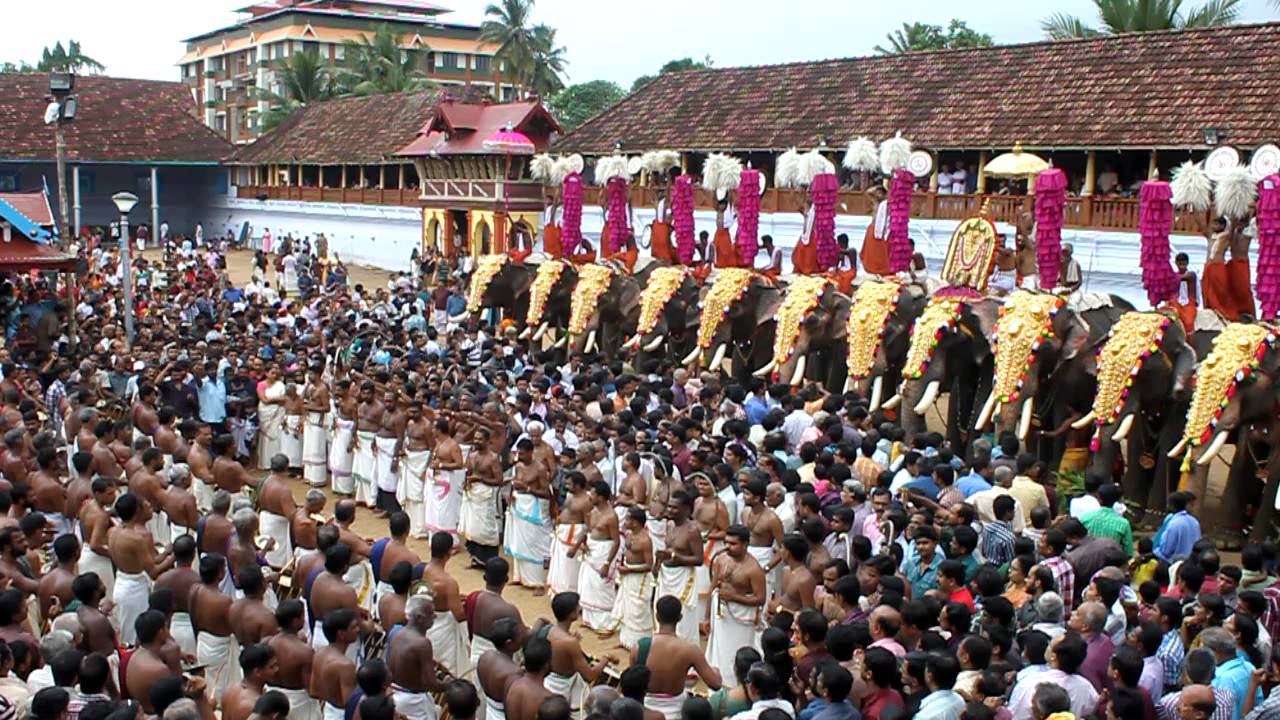Attracted by the holiness of the ancient Vedic Village, POORNAVEDAPURAM, (now Tripunithura), lord Vighnesha himself occupied the place. Angry Arjuna kicked him aside to the southern side of the sanctum and installed the idol in that holy place surrounded by mustard fields. He then plucked some mustard seeds and crushed them to get oil for lighting lamp in front of the idol. Devotees consider the evershining “Valia Vilakku” situated in front of the idol, as the oil lamp lighted by Arjuna. Burnt oil of this traditional lamp possesses great medicinal value. The deity, ever since has been living in the minds and hearts of devotees as Santhanagopala Moorthy, blessing the needy, infertile couples with children.
Stories relating Sree Poornathrayeesa as the elder brother of the goddesses of Chottanikkara and Pishari temples are also popular among the people. Lord Poornathrayeesa is also believed to be wedded to a Namboothiri girl,”Nangema”, from Vadakkedathu Mana. Dieties from local temples like “Perumthrikovil”(Lord Shiva) and “Pishari kovil”(Lakshmi) will come here during their annual festive occasions to participate in a combined procession, locally termed as “Sankara Narayana Vilakku”(Shiva and Vishnu) and “Laksmi Narayana Vilakku”(Goddess Laksmi and Lord Vishnu) respectively. Aarattu (the holy bath of the diety) after the annual festival of Sree Poornathrayeesa takes place at the temple pond of Chakkamkulangara Shiva Temple, nearly half a kilometer North-East to Sree Poornathrayeesa Temple.
The entire structure of the temple except the West Gopuram (Gateway) was redesigned in the year 1921 by the great architect Late Sri Eachara Warrier. Before that the temple structure was in a reduced form with tiled roof and wooden ceiling. The east gopuram was also smaller than the present structure.
In 1920 (Malayalam year 1096) the entire structure other than the west gopuram was destroyed in an accidental fire. Fortunately the devotees could save the main idol from fire by covering it with a huge vessel coated with clay.The other idols were shifted to Puthan Bunglow (Family temple of the Cochin Royal Family) and the King of Cochin state ordered to reconstruct the temple structure by completely avoiding the accident-prone wood works. In accordance with the King’s order Eachara Warrier skillfully blended the traditional architecture with the modern means of construction like concrete and reconstructed the temple with fireproof materials like Copper, Concrete, Granite and Bronze.
The west gopuram which could survive the devastating fire of 1920 is believed to be built by some divine powers and the age of this structure, still remains a mystery. Here the devine sculptures in their crude form bear a unique beauty.The first floor of this two storied gopuram consists of a mandapam (Dias), supported by eight beautifully carved wooden pillars.
Representing the Lord of Vaikunta and Yoganarayan,the deity is the Lord incarnate of the triune Vedas.
Ensconced with Goddess of Earth, Bhoomi Devi, and Goddess of Prosperity, Lakshmi Devi, under the umbrella – like hoods of the Serpent King Anantha the Godhead has been the provider of all the wishes of His devotees – the giver of all the pleasures, in this world and the provider of salvation, in the other world.
